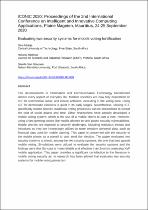JavaScript is disabled for your browser. Some features of this site may not work without it.
- ResearchSpace
- →
- Research Publications/Outputs
- →
- Conference Publications
- →
- View Item
| dc.contributor.author |
Moloja, D

|
|
| dc.contributor.author |
Mpekoa, Noluntu

|
|
| dc.contributor.author |
Van Greunen, D

|
|
| dc.date.accessioned | 2020-11-06T10:47:30Z | |
| dc.date.available | 2020-11-06T10:47:30Z | |
| dc.date.issued | 2020-09 | |
| dc.identifier.citation | Moloja, D., Mpekoa, N. & Van Greunen, D. 2020. Evaluating two security systems for mobile voting fortification. In: ICONIC 2020: Proceedings of the 2nd International Conference on Intelligent and Innovative Computing Applications, Plaine Magnien, Mauritius, 24-25 September 2020 | en_US |
| dc.identifier.isbn | 978-1-45037558-0 | |
| dc.identifier.uri | https://dl.acm.org/doi/10.1145/3415088.3415109 | |
| dc.identifier.uri | https://dl.acm.org/action/showFmPdf?doi=10.1145%2F3415088 | |
| dc.identifier.uri | http://hdl.handle.net/10204/11663 | |
| dc.description | Presented in: ICONIC 2020: Proceedings of the 2nd International Conference on Intelligent and Innovative Computing Applications, Plaine Magnien, Mauritius, 24-25 September 2020. Due to copyright restrictions, the attached PDF file contains the abstract of the full-text item. For access to the full-text item, please consult the publisher's website. | en_US |
| dc.description.abstract | The developments in Information and Communication Technology transformed almost every aspect of everyday life. Modern societies are now fully dependent on ICT for commercial, labor, and leisure activities, excluding in the voting area. Using ICT for democratic elections is quiet in its early stages. Nevertheless, utilizing ICT, specifically mobile phones, traditional voting processes can be streamlined to except the cost of social assets and time. Other researchers have already developed a mobile voting system, which is the use of a mobile phone to cast a vote. However, using a fast-growing device like mobile phones to vote poses security vulnerabilities. Mobile phones are exposed to security challenges, including malicious threats and intrusions as they are increasingly utilized to store sensitive personal data, such as financial data used for mobile banking. This paper is concerned with the security of the mobile phone as a utensil to vote amid the election. The paper evaluated two security systems to check, among the two-security systems, the one that best guards mobile voting. Simulations were utilized to evaluate the security systems and the findings were that Suricata is more reliable and effective than Snort in protecting XaP mobile application. This paper provides a significant contribution to the literature in mobile voting security as no research has been piloted that evaluates two security systems for mobile voting protection. | en_US |
| dc.language.iso | en | en_US |
| dc.publisher | Association for Computing Machinery | en_US |
| dc.relation.ispartofseries | Workflow;23907 | |
| dc.subject | Mobile voting | en_US |
| dc.subject | Fortification | en_US |
| dc.subject | Mobile security | en_US |
| dc.subject | Cloud computing | en_US |
| dc.subject | Mobile phone | en_US |
| dc.subject | Cyber security | en_US |
| dc.title | Evaluating two security systems for mobile voting fortification | en_US |
| dc.type | Conference Presentation | en_US |
| dc.identifier.apacitation | Moloja, D., Mpekoa, N., & Van Greunen, D. (2020). Evaluating two security systems for mobile voting fortification. Association for Computing Machinery. http://hdl.handle.net/10204/11663 | en_ZA |
| dc.identifier.chicagocitation | Moloja, D, Noluntu Mpekoa, and D Van Greunen. "Evaluating two security systems for mobile voting fortification." (2020): http://hdl.handle.net/10204/11663 | en_ZA |
| dc.identifier.vancouvercitation | Moloja D, Mpekoa N, Van Greunen D, Evaluating two security systems for mobile voting fortification; Association for Computing Machinery; 2020. http://hdl.handle.net/10204/11663 . | en_ZA |
| dc.identifier.ris | TY - Conference Presentation AU - Moloja, D AU - Mpekoa, Noluntu AU - Van Greunen, D AB - The developments in Information and Communication Technology transformed almost every aspect of everyday life. Modern societies are now fully dependent on ICT for commercial, labor, and leisure activities, excluding in the voting area. Using ICT for democratic elections is quiet in its early stages. Nevertheless, utilizing ICT, specifically mobile phones, traditional voting processes can be streamlined to except the cost of social assets and time. Other researchers have already developed a mobile voting system, which is the use of a mobile phone to cast a vote. However, using a fast-growing device like mobile phones to vote poses security vulnerabilities. Mobile phones are exposed to security challenges, including malicious threats and intrusions as they are increasingly utilized to store sensitive personal data, such as financial data used for mobile banking. This paper is concerned with the security of the mobile phone as a utensil to vote amid the election. The paper evaluated two security systems to check, among the two-security systems, the one that best guards mobile voting. Simulations were utilized to evaluate the security systems and the findings were that Suricata is more reliable and effective than Snort in protecting XaP mobile application. This paper provides a significant contribution to the literature in mobile voting security as no research has been piloted that evaluates two security systems for mobile voting protection. DA - 2020-09 DB - ResearchSpace DP - CSIR KW - Mobile voting KW - Fortification KW - Mobile security KW - Cloud computing KW - Mobile phone KW - Cyber security LK - https://researchspace.csir.co.za PY - 2020 SM - 978-1-45037558-0 T1 - Evaluating two security systems for mobile voting fortification TI - Evaluating two security systems for mobile voting fortification UR - http://hdl.handle.net/10204/11663 ER - | en_ZA |






